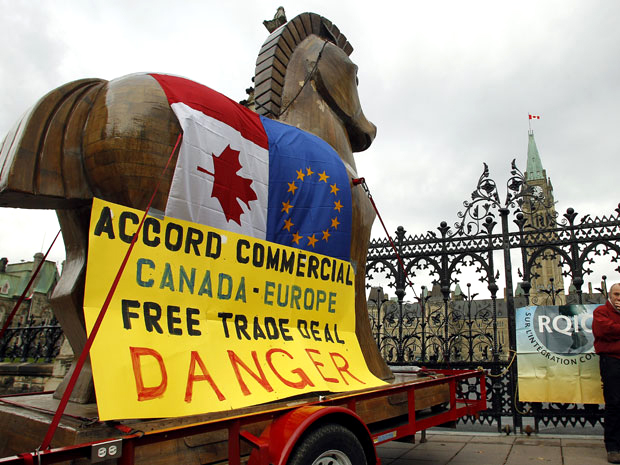Newfoundland and Labrador premier Paul Davis’ opposition to the Canada-European Union “free trade” agreement over a disputed $280-million federal contribution to a fund to “offset” the negative impacts of the deal given the loss of minimum processing requirements (MPRs) for the fisheries is undoubtedly creating a major political headache for prime minister Stephen Harper. But all provincial premiers and territorial leaders should also be thinking through the implications of CETA’s investor-state provision on their provincial budgets.
First, Harper’s headache.
Earlier last week, Toronto Star national affairs columnist Tim Harper wrote, “Harper is steering his re-election bid over a landscape now littered with … a huge trade deal that is more boast than reality… Initially, it must have looked good. …A signature trade deal with the European Union, the largest trade deal ever signed, creating jobs and markets for Canadian manufacturers. …Now provincial discontent, led by Newfoundland, threatens to deliver severe damage to a wobbly deal.”
And then trade minister Ed Fast was hounded by the issue at a conference on CETA that he attended in Rome. The Globe and Mail reported, “Mr. Fast tried to explain to the Italian delegates that a dispute between Ottawa and Newfoundland and Labrador should not derail the deal.” Fast said, “The signing of the trade agreement falls within the exclusive jurisdiction of the federal government. Newfoundland does not have the ability to stop us.” But the article highlights, “While Canada can go ahead, it might have to do so without the ability to ensure that Newfoundland will enforce all aspects of CETA within the province, such as the elimination of the MPRs. That theoretically would allow the EU to use investor-protection clauses to sue Canada if Newfoundland violates CETA.”
The deadline for Harper and Fast to resolve the dispute with Newfoundland and Labrador may be very short.
That’s because Glyn Moody tells us that an analysis by Greenpeace suggests that the investor-state dispute settlement (ISDS) provisions in CETA, which is currently going through a “legal scrub,” could be provisionally applied after both parties in the agreement indicate that their respective relevant procedures have been completed. Moody explains, “There’s no explicit requirement there for those ‘relevant procedures’ to include ratification by the European Parliament or the EU Member States: the European Commission might claim that the ‘relevant procedures’ simply meant things like the legal scrub.”
Perhaps even more disturbing, he adds, “Now suppose that the European Parliament, or one of those Member States, does not ratify CETA, perhaps because of the investor-state dispute settlement mechanism, in which case the entire agreement would fail. …[But] even if CETA is rejected in Europe, thus causing the provisional application to be terminated, claims under the ISDS chapter would still be possible up to three years afterwards for investments made during the provisional period.”
While Moody says this may sound theoretical, he notes that Russia was fined $50 billion by an ISDS tribunal given the Energy Charter Treaty’s provisional application, a treaty that Russia didn’t ratify. This treaty, between the European Union and fifty-one other countries, also has an investor-state provision. It is under this treaty that the Swedish energy company Vattenfall sued Germany both for municipal regulations against coal-fired power plants to protect the Elbe River and over the federal government’s decision to phase out nuclear power stations.
But wait, who might have to pay the bill for a municipal or provincial measure that is found by a tribunal to be non-compliant with (even a provisional) CETA?
Provincial premiers in Canada who are only giving nominal support to their counterpart in Newfoundland and Labrador would do well to remember the Harper government’s $130 million pay-out to AbitibiBowater to settle a NAFTA investor-state dispute in 2010. What is significant in this case is that Harper both did not defend the province’s right to take the action that it did but also stated, “I do not intend to get back the monies expended in this case from the government of Newfoundland and Labrador. But I have indicated that in future, should provincial actions cause significant legal obligations for the government of Canada, the government of Canada will create a mechanism so that it can reclaim monies lost through international trade processes.”
If Harper intends to hold provincial governments accountable for future CETA-related damages with respect to provincial measures, the premiers may want to give more than lip-service solidarity on the fisheries fund in that they could find themselves on the hook for millions more.
For more on our campaign against the Canada-European Union Comprehensive Economic and Trade Agreement, please click here.




